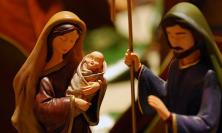Peter Edmonds SJ refelects on the readings for the second week of Christmas.
1 January, Mary, Mother of God: World Day of Peace
Numbers 6:22-27; Galatians 4:4-7; Luke 2:16-21
As for Mary, she treasured all these things and pondered them in her heart. (Luke 2:19)
As we begin a new year, it is good to commit to memory the blessing which Moses, in obedience to God, instructed his brother Aaron to pronounce over Israel. ‘May the Lord bless you and keep you. May the Lord let his face shine on you and be gracious to you. May the Lord uncover his face to you and bring you peace’. In 1967 Pope Paul VI established the World Day of Peace, inspired by the encyclical Pacem in terris of his predecessor, Pope John XXIII, and his own encyclical Populorum progressio.
We also hear today from Paul’s letter to the Galatians the only mention in Paul’s letters of the birth of Jesus: ‘God sent his Son, born of a woman’. God had given the Jews the Law on Mount Sinai. This Law had taught them to recognise what was wrong, but did not provide the means to overcome it. God’s remedy was to send his Son, born of a woman. God could not have given us a greater blessing.
We close Christmas week by returning to the Christmas crib. Again we meet the shepherds; we meet unnamed bystanders. We meet Mary, to whom we dedicate this day as Mother of God. The shepherds come, see, praise God and disappear. The bystanders, astonished, like the shepherds, disappear. Mary treasured these things and pondered them in her heart. In the gospel story, Jesus praises her for hearing the word of God and keeping it. We welcome her into our company this new year.
Prayer
Father, we begin this new year asking for a blessing as we join the shepherds , praising and glorifying God. We treasure and ponder these truths of Christmas in our hearts as Mary did. May this day be a day of peace. We ask this through Christ our Lord.
2 January: John the witness
1 John 2:22-28; John 1:19-28
‘Why are you baptising if you are not the Christ, and not Elijah, and not the prophet?’ (John 1:25)
This first week of the year puts us in mind of other first weeks in life, whether this be our first week of school, our first week in a new job, our first week in any life situation. This week in our liturgy, we learn about the first week of the public ministry of Jesus, as reported in John’s Gospel. On this first day, we meet the one who introduces Jesus, John the Baptist. We might well call him John the witness.
Challenged to give his identity, he issued three denials, denials which bring us into the atmosphere and expectations of those days. He denied that he was the Christ, meaning an anointed one like King David of old. He denied that he was Elijah, the ancient prophet who had been carried up to heaven in a chariot of fire and was expected to return. He denied that he was ‘the prophet’, that is the prophet like himself whose coming Moses had promised. Positively, John claimed to be the voice of whom Isaiah had spoken. He was the voice who was to proclaim the Word, who was Jesus.
The story that the gospels relate is not only about Jesus. It is also about his disciples and followers. Their story anticipates our story, because as members of the Church, we are disciples too. John preceded rather than followed Jesus, but his activity of witnessing to Jesus is the vocation of every baptised person. All of us, however we identify ourselves, are called to be a voice of Jesus in our world and to witness to him by our lives, as John did long ago.
Prayer
Lord, help us to begin this new year well. Help us reflect on our own identity as John the Baptist did, and to understand our role as witnesses to you and to the values of your kingdom. We make this prayer through the same Christ the Lord.
3 January: The Lamb of God
1 John 2:29 – 3:6; John 1:29-34
‘There is the lamb of God that takes away the sin of the world.’ (John 1:29)
Three times in the course of the Mass, the congregation joins the Presider in calling upon Jesus as the Lamb of God. These same words are repeated before the distribution of Holy Communion. Many who have never attended Mass, know the expression because great composers have set it to music in memorable and beautiful arrangements, in which they too call upon this Lamb of God to have mercy and to grant peace.
John the Baptist used this expression in his witness to Jesus. The title has many associations. It suggests that Jesus took the place of the lamb that was sacrificed at the Jewish feast of Passover. The Passover lamb won freedom from Egyptian slavery in the past; Jesus wins deliverance from the power of sin by his death. The servant of whom the prophet Isaiah wrote was led like a lamb to the slaughter; so too would Jesus be led in his passion. Other traditions related that a lamb guided God’s people to victory in past conflicts. Jesus was the lamb at the head of his people in their strife with the powers of this world; this is a theme developed in the Book of Revelation.
It is profitable to reflect on the various names given to Jesus in the gospels. In modern culture, lambs have little symbolic meaning. They may be fluffy creatures in the spring sunshine or make succulent items in a tasty meal. But reflection on their significance in gospel times will surely aid us to deepen our understanding of how God loved the world so much that he gave his only Son.
Prayer
Lord, may our prayer and reflection lead us to a deeper knowledge of who you are, particularly as we reflect on the scriptures and the language they use to speak of you and your coming to save us. We make this prayer through the same Christ our Lord.
4 January: Staying with Jesus
1 John 3:7-10; John 1:35-42
‘“What do you want?” They answered, “Rabbi”, which means teacher, “where do you live?” “Come and see,” he replied.’ (John 1:38)
When in a drama a new character appears, especially one who has been introduced in striking and novel terms, there is anticipation among the audience as they listen out for his or her first spoken words. In the Gospel of John, the evangelist has introduced Jesus as the ‘Word’ and John the Baptist has proclaimed him as ‘Lamb of God’. What will such a person have to say?
His first words are addressed to two disciples of John the Baptist. They were following Jesus; before speaking, he turned to them and looked at them. He questioned them: ‘What are you looking for?’ Whether bewildered, curious, or taken aback, they answered with a question of their own, which of itself does not make much sense: ‘Where do you live?’. Both these questions have a significance beyond the obvious. The question of Jesus is addressed to everyone who hears this gospel. The question of the disciples is fundamental for anyone who wants to understand the person of Jesus.
The two disciples went with Jesus and lived with him for that day. It was as if they were accepting the invitation of Wisdom to enter into her house and to share her food, for presumably Jesus and the two disciples shared a meal together. Elsewhere in John’s Gospel, we learn that Jesus really lived in the bosom of his Father, and that when someone loved him and kept his word, then he and the Father would come and make their home with that person. These are typical truths which John wants to teach us in his gospel. As for the two disciples, they were now disciples of Jesus.
Prayer
Lord, you invite us into your house to hear your word and share your Eucharist. May we, like Andrew and his friend, feel at ease in your presence and eager to share what we learn from you. We make our prayer through the same Christ the Lord.
5 January: Called by Jesus
1 John 3:11-21; John 1:43-51
‘Before Philip came to call you,’ said Jesus, ‘I saw you under the fig tree.’ (John 1:48)
People experience God and the divine presence in different ways. Some find God in the activity of everyday life, others meet God more directly, as it were face-to-face. In the Gospel of John, to encounter Jesus is to encounter the Word of God. In this first week of Jesus’s ministry, Andrew, Simon and an unnamed disciple came to Jesus because of the word of another, but Philip came to Jesus because Jesus called him personally. Philip went on to inform Nathanael, who met Jesus because of Philip’s summons.
A pattern emerges in these vocation stories. Each of those called first addresses Jesus with one title and concludes with another which is more profound. Each is drawn to share his discovery of Jesus and to introduce another person to him, who in turn becomes another ambassador for Jesus. As for Jesus himself, he demonstrates awareness of both past and future. Through an obscure reference to a fig tree, he proves his previous knowledge of Nathanael. He prophesies his future by promising that he would see angels ascending and descending on the Son of Man.
The atmosphere in this first chapter of John is unhurried and tranquil. The reader enjoys a quiet interlude before the dramas to come in this gospel. Each of us is invited to hear the voice of Jesus addressing us and inviting us to stay with him. Hopefully we too will want others to share such an encounter. We all need to deepen our knowledge of who this Jesus might be, and to rejoice with him that he is the means through which communication is opened up between heaven and earth.
Prayer
Lord, when you came among us, you called disciples to learn from you and to follow you. Some you called directly and some through others. Help each of us to recognise our personal vocation, however it might come. We make this prayer through the same Christ the Lord.
6 January, the Epiphany of the Lord: The wise men
Isaiah 60:1-6; Ephesians 3:2-3. 5-6; Matthew 2:1-12
'Going into the house they saw the child with his mother Mary, and falling to their knees they did him homage.' (Matthew 2:11)
The great stories of the world are told again and again, because of the twists and surprises in their plots, the variety and contrasts of their characters, the pace and liveliness of their action. Such is the story of the journey of the Magi which we hear on this feast of the Epiphany. It raises questions. Why should wise men from the East travel so far to come to Bethlehem? How would a wicked king Herod react to enquiries about the birth of rival king? Why should the whole of Jerusalem be troubled by their arrival? And why should these men worship a child and give it extravagant gifts?
Epiphany means revelation. These wise men receive revelation from three sources. They find it in the natural phenomena typified by the star. They seek for it in the words of scripture given them by the scribes whom the king consults. Revelation reaches a climax when they meet the child and its mother. They are filled with joy, present their gifts, and worship. And then back they go to their own country.
This old story can teach us many things. The child Jesus, born at Christmas, is for the whole of humanity. His coming challenges and troubles a complacent world. King Herod would do his best to eliminate the child. The scribes ignored what they knew from their learning, disregarding the message of the star and the scriptures. As for ourselves, we are to join those wise men in their visit to the child and his mother, and then return to our daily existence at the beginning of this new year, as people changed and renewed.
Prayer
Father, you brought the wise men to your Son through your presence in creation and your revelation in scripture. Direct us so that we may find you in all things and be attentive to what you tell us in your sacred word. We make this prayer through Christ the Lord.
[Where the Epiphany is celebrated on Sunday:
6 January: The baptism of Jesus
1 John 5:5-13; Mark 1:6-11
‘I have baptised you with water, but he will baptise you with the Holy Spirit.’ (Mark 1:8)
Life often brings up the unexpected and this happens with our daily liturgy. Today we hear in our gospel about the baptism of Jesus because in this year’s calendar, there is no space for it on the Sunday when we normally celebrate it. We interrupt our readings from John in order to hear Mark’s account of the baptism of Jesus, the first public appearance of Jesus in his gospel.
In describing the dress and diet of John the Baptist, Mark links him with the past prophets of Israel. In reporting his words, Mark makes clear how superior Jesus will be to John. Jesus is ‘the stronger one’ and the baptism that he will give, will be a baptism of the Holy Spirit. But first Jesus himself must be baptised. We are to put ourselves in spirit on the banks of the Jordan river. There among the crowds we glimpse Jesus arriving from Nazareth. With them, he enters the water. As he comes out, we see the Holy Spirit coming down on him in the shape of a dove. Then we hear a voice from heaven, the voice of the Father, and we attend to his words by which he proclaims that Jesus is his Son, the Beloved.
We have been given a vision of the Holy Trinity – Father, Son and Spirit. Every time we pray the sign of the cross, invoking the names of the Father, the Son and the Spirit, we call to mind that baptism in the Jordan river. Our own baptism has given us the dignity of rebirth in the family of the Trinity. We are the beloved of the Father.
Prayer
Father, you spoke to your Son as he was baptised in the Jordan river. May we, too, hear your voice as we live out our lives as your followers in the world to which your Son came and in which your Spirit lives. We make this prayer through Christ the Lord.]
7 January: Celebration at Cana
1 John 5:14-21; John 2:1-11
‘His mother said to the servants, “Do whatever he tells you”.’ (John 2:5)
The end of a week is usually greeted with relief, even with a thankful prayer that it is Friday at last. But some weeks are special. Such was the first week in the bible which reached its climax with the creation of the man and woman whom God told to be fruitful and multiply. So, too, is the first week in John’s Gospel; this concludes with the first of the signs given by Jesus, the marriage feast at Cana.
Jesus was present at this marriage, together with the disciples whose first meetings with him have been described to us on previous days. His mother, addressed by Jesus as ‘woman’, was there too. She informed her son of a problem; the wine had run out. Despite his apparent reluctance to act, she instructed the servants to do whatever he told them; she was a woman of faith. Jars, standing there for water to be used in purification rituals, were tasted and were found to contain not water, but excellent wine.
We are not to get excited about the amount of alcohol implied by the story. This new wine points to the abundance offered to the world by the presence of Jesus and his teaching he is to give. He himself is the bridegroom come into the world, claiming a bride that had strayed. Israel’s prophets had taught how God was married to his people. Christ was now restoring this relationship. Mary believed in her Son; now the disciples did so too, because they saw his glory. We pray that this first week of our new year has offered us a glimpse of this glory.
Prayer
Father, as we conclude the first week of our new year, help us live in the presence of your Son and through recognising the signs of his glory, may we, through the intercession of his mother, come to an ever-deeper faith. We make this prayer through Christ our Lord.






